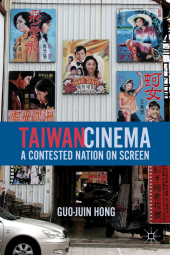 Neuerscheinungen 2013Stand: 2020-01-07 |
Schnellsuche
ISBN/Stichwort/Autor
|
Herderstraße 10
10625 Berlin
Tel.: 030 315 714 16
Fax 030 315 714 14
info@buchspektrum.de |

G. Hong
Taiwan Cinema
A Contested Nation on Screen
2011. 2013. xv, 229 S. 216 mm
Verlag/Jahr: SPRINGER PALGRAVE MACMILLAN; PALGRAVE MACMILLAN US 2013
ISBN: 1-13-729009-9 (1137290099)
Neue ISBN: 978-1-13-729009-0 (9781137290090)
Preis und Lieferzeit: Bitte klicken
A groundbreaking study of Taiwan cinema, Hong provides helpful insight into how it is taught and studied by taking into account not only the auteurs of New Taiwan Cinema, but also the history of popular genre films before the 1980s. The book is essential for students and scholars of Taiwan, film and visual studies, and East Asian cultural history.
Introduction: Taiwan Cinema and the Historiography of Absence PART I: GENRES Colonial Archives, Postcolonial Archaeology: Pre-1945 Taiwan and the Hybrid Texts of Cinema before Nation Cinema among Genres: An Unorthodox History of Taiwan´s Dialect Cinema, 1955-1970 Tracing a Journeyman´s Electric Shadow: Healthy Realism, Cultural Policies, and Lee Hsing, 1964-1980 Interlude: Hou Hsiao-Hsien before Hou Hsiao-Hsien: Film Aesthetics in Transition, 1980-1982 PART II: STYLE A Time to Live, a Time to Die: New Taiwan Cinema and Its Vicissitudes, 1982-1986 Island of No Return: Cinematic Narration as Retrospection in Wang Tong´s Taiwan Trilogy and Beyond Anywhere But Here: The Postcolonial City in Tsai Ming-Liang´s Taipei Trilogy Afterword: Cinema after Nation
"Hong is particularly strong when it comes to analyzing the films of [the "new wave"] period, and it is a pleasure to rethink these films in light of his sensitive and intelligent insights. . .[Taiwan´s national identity] is made richer by scholars like Hong, who passionately argue and reargue the nature of a national identity. His book adds one more narrative to a debate that derives its richness from its diverse perspective sand its never-ending reinterpretation of identity in a restless and dynamic society." - Taiwan Review
"Recommended." - CHOICE
´For most of us, Taiwan cinema has meant Hou Hsiao-Hsien, Edward Yang, Tsai Ming-Liang and perhaps Ang Lee, incredible talent from an orphan island, but by no means the whole roster. Guo-Juin Hong puts these masters into a grand historical picture, highlighting other directors and genres, and earlier moments. His accounts of production circumstances and his lovingly detailed evocations of images and stories make us crave to see more, while adding a significant dimension to the films we have always cared about. Meanwhile he shows us how and why such cinematic intensity vibrates in Taiwan, that strangely uncomfortable, yet fantastically creative ´home of the homeless.´´ - Dudley Andrew, Yale University
´This is a wonderful work it offers a deep and provocative engagement with the historiography of Taiwan cinema. Canvassing a large body of historical material and films both well known canons as well as ´forgotten´ films, popular melodrama as well as art cinema this well organized and eloquently written book will be indispensable reading for students of Taiwan film and culture history. A major contribution.´ - Zhen Zhang, Associate Professor of Cinema Studies and East Asian Studies, New York University and author of An Amorous History of the Silver Screen: Shanghai Cinema 1895-1937
´Hong´s book richly fulfills its ambitious agenda. It is sure to become an instant classic, constituting simultaneously an intervention in critical Taiwan studies, a case study in colonial and postcolonial nationalisms, and by far the most comprehensive history of Taiwan cinema available in English. A benchmark for studies in years to come, providing a foundation that future scholarship can build upon.´ - Jason McGrath, Associate Professor of Modern Chinese Literature and Film, University of Minnesota, Twin Cities
´Not only an indispensable guide to a rich filmic realm, but also an innovative rethinking of one of the most persistent paradigms in film studies: the discourse of national cinema. Through a series of deft close readings of both the masterpieces of the New Wave and lesser known, but no less fascinating, genre films, Hong reveals the ways in which ´Taiwan cinema´ has always been a dangerously ´theoretical´ undertaking.´ - Andrew F. Jones, Professor of East Asian Languages and Cultures, University of California, Berkeley


